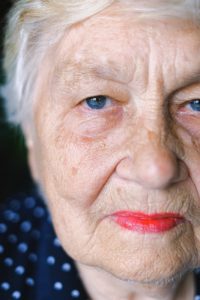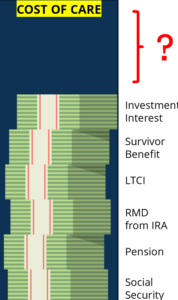Essential Planning for Solo Agers
A Google search for solo ager brings up 26 million links. Each month, our blog pulls together curated resources for our clients and prospective clients. This month, we focus on three important planning elements for solo agers – healthcare, housing, and finances – because there is one very critical question that needs answering:
In an emergency, who is your go-to person? In other words, who will be called on your behalf to make medical and financial decisions?
 These are very real and complex decisions, but ones that people living alone without nearby relatives or close friends need to be prepared for. So, whether they plan for it or not, managing finances on their own will likely be required at some point in a woman’s life. If you think it can’t happen to you, here are three sobering statistics from the Women’s Institute for a Secure Retirement.
These are very real and complex decisions, but ones that people living alone without nearby relatives or close friends need to be prepared for. So, whether they plan for it or not, managing finances on their own will likely be required at some point in a woman’s life. If you think it can’t happen to you, here are three sobering statistics from the Women’s Institute for a Secure Retirement.
- 80% of men die married, while 80% of women die single
- By the time a woman is 75 years old, there’s a 70% chance she will need assisted care at some point
- Of the 5.3 million people aged 65 and older who have Alzheimer’s, 62% are female
What is solo aging?
Solo agers live alone by choice or due to circumstances; they never had children or are estranged from them. AARP defines solo agers as those over age 50 living alone, not married or partnered in a long-term relationship, and having no children. They make up 12% of the population ages 50+ in the United States.
Leading speaker on solo aging, Sara Zeff Geber, Ph.D., explains, “Twelve million adults over age 65 live alone. That is 27% of the population–the highest rate in the world. The majority are women. By age 75, the rate of women living alone rises to 44%.”
“Of the 92 million adults ages 55 and older in 2018, 15 million (16.5%) are childless, defined as having no biological children,” according to the US Census. “Among Baby Boomer women, 19.4% never gave birth, so there are no children or grandchildren to pick up the mantle of caregiving.”
In an AARP survey, “More so than other older adults, solo agers tend to be worried about losing their independence, being alone without family or friends around them, and not being able to stay in their home. Solo agers are more likely to fear dying alone (46% vs. 37%), being moved somewhere against their will (50% vs. 33%), and having a court appoint someone to make decisions for them (39% vs. 27%). Only about one-third of solo agers say they have someone who could help manage their household or handle day-to-day expenses if they could no longer do so.”
 Other people say everyone has the potential to be a solo ager. Even in married couples, one will die first and leave the other behind. If they’re Boomers, they may not have kids, or as Glenna Crooks explains, “even if couples have kids, since 40% of American adults live (on average) 700 miles from family, they may not have nearby support.” According to HebrewSeniorLife.org, “those who fall within the solo aging category have no children or close relatives upon whom they can depend on to make critical legal, medical, or financial decisions should they be unable to do so themselves.”
Other people say everyone has the potential to be a solo ager. Even in married couples, one will die first and leave the other behind. If they’re Boomers, they may not have kids, or as Glenna Crooks explains, “even if couples have kids, since 40% of American adults live (on average) 700 miles from family, they may not have nearby support.” According to HebrewSeniorLife.org, “those who fall within the solo aging category have no children or close relatives upon whom they can depend on to make critical legal, medical, or financial decisions should they be unable to do so themselves.”
What does success look like for solo agers?
Growing older without a significant other or adult child means solo agers will need to build a team—including extended family, trusted friends, and paid professionals—who can help with their finances, make medical decisions if incapacitated, and prevent them from becoming isolated as they age.
Joy Loverde, a senior living expert, industry veteran, and author of The Complete Eldercare Planner and Who Will Take Care of Me When I’m Old? says, “If you realize that your circumstances will mean that you will become a solo ager, it is important to start as early as possible to plan for the future. This includes planning for your financial, emotional, and physical well-being. Planning for solo aging is much easier and far less stressful if it is done BEFORE a crisis.” Solo aging boomers have the opportunity today to plan for their less-independent years. Planning is needed for healthcare, including long-term care, housing, and finances.
Healthcare and Long-Term Care Planning
For the healthcare team, solo agers need friends, extended family members, a geriatric care manager, a healthcare proxy, and possibly long-term care insurance. A senior care manager can help with Medicare paperwork, monitor medications, help solo agers find a home health aide, or evaluate long-term care communities. Care managers can also recommend other professionals like lawyers, CPAs, and financial planners.
Healthcare planning is not long-term support and services (LTSS) planning. LTSS – also called long-term care – are costs associated with care that someone can no longer provide for themselves. According to Genworth Financial, the average price of a private room in a nursing home is now $297 per day. The median cost of hiring a home health aide is $27 per hour or almost $56,160 yearly for a 44-hour week. Nearly 70% of older adults will eventually need some form of long-term care, and about 20% are likely to need it for more than five years. Women typically need care for more extended periods than men.
 Healthcare planning is adjacent to estate planning, and it can be tricky for childless older adults and solo agers. However, getting the correct documents in place will make things easier if age or illness leaves solo boomers unable to manage their own affairs or make medical decisions. It could also prevent ugly court battles among their extended family.
Healthcare planning is adjacent to estate planning, and it can be tricky for childless older adults and solo agers. However, getting the correct documents in place will make things easier if age or illness leaves solo boomers unable to manage their own affairs or make medical decisions. It could also prevent ugly court battles among their extended family.
- Solo agers need a living will to enumerate their wishes for treatment in certain medical situations and ensure a trusted person makes other medical decisions. Forms for state-specific living wills may be found at caringinfo.org.
- A health care proxy, sometimes referred to as a power of attorney for health care or an advance directive, gives a person designated by a solo boomer the right to make medical decisions on their behalf if they can’t speak for themselves.
- Solo agers will also want a medical release form permitting doctors to share information with people they’ve selected. Doctors and hospitals may have their own documents. Financial advisers and other financial professionals often have similar forms called a letter of diminishing capacity that allows them to contact doctors or trusted friends if they’re concerned about a solo ager’s competency.
Housing Planning
 A plan involves forming and maintaining a support network (or community). Wealthier boomers may choose to solve the problem by moving into life plan communities, continuous care retirement communities (CCRC), or senior housing communities. Lower- and middle-income boomers may have opportunities to move into 2Life Communities, which is being developed in the Boston area. These communities serve the underlying belief that everyone deserves to live a life of stability, purpose, and connection.
A plan involves forming and maintaining a support network (or community). Wealthier boomers may choose to solve the problem by moving into life plan communities, continuous care retirement communities (CCRC), or senior housing communities. Lower- and middle-income boomers may have opportunities to move into 2Life Communities, which is being developed in the Boston area. These communities serve the underlying belief that everyone deserves to live a life of stability, purpose, and connection.
Some alternatives to community living include:
- The Village to Village Network allows solo Boomers to age in place while planning for the long-term care they will need in their late 80s and 90s.
- Naturally occurring retirement communities (NORCs), with at least 40% of the population 60+, have people usually living in their own homes or apartments. Residents pay an annual membership fee for access to transportation, social activities, or health care management services. Social service agencies, health care providers, and other organizations often offer on-site services to residents.
- Home sharing can be arranged through Silvernest, a matching service that can facilitate an arrangement (like the Golden Girls) anywhere in the country or the National Shared Housing Resource Center.
- Auxiliary dwelling units (ADUs) on a property with an existing home can be rented to another solo ager or a younger family member, offered to a young person for reduced rent in exchange for household help and companionship, or used for a caregiver.
- Relocating to a safer style of home. It could be a condominium or apartment complex near shopping and services, a smaller, one-level home (with fewer square feet, newer, universal design, and more age-friendly appointments) in a 55+ (also called Active Adult) community, or a mobile home park.
Financial and Legal Planning
Solo agers need to find people who will manage their financial and medical affairs and probably need people to stop by, run errands, or drive them to appointments. Many solo seniors branch out on the family tree, tapping siblings, nieces, nephews, or cousins, while others add close friends to the mix.
Solo boomers will also need some professionals in their corner, mainly as they grow older, including fiduciaries, CPAs, lawyers, and care managers. A certified financial planner (fiduciary) can take a comprehensive approach, assess their finances, act as a sounding board, and help them assemble and direct a team of other professionals. Find advisors with the CFP credential at letsmakeaplan.org, or find a fee-only adviser at napfa.org. For more help finding and vetting a financial planner, see kiplinger.com/links/advice.
Know Where Income is Coming From
 It’s essential to have enough cash on hand to cover emergencies, from a furnace that quits in the dead of winter to a fall that requires a stay in the hospital. Money needs to be bucketed into day-to-day expenses, healthcare costs and insurance, and savings for long-term care needs. While couples generally aim to keep 3-6 months of living expenses in an emergency fund, many financial planners suggest that solo agers aim for a larger cushion, stashing between 9-12 months of living expenses in a savings account. As solo boomers approach retirement, they need to consider bulking up the account with at least two years of living expenses so that in the event of a market downturn, they won’t have to sell investments at a loss to pay the bills.
It’s essential to have enough cash on hand to cover emergencies, from a furnace that quits in the dead of winter to a fall that requires a stay in the hospital. Money needs to be bucketed into day-to-day expenses, healthcare costs and insurance, and savings for long-term care needs. While couples generally aim to keep 3-6 months of living expenses in an emergency fund, many financial planners suggest that solo agers aim for a larger cushion, stashing between 9-12 months of living expenses in a savings account. As solo boomers approach retirement, they need to consider bulking up the account with at least two years of living expenses so that in the event of a market downturn, they won’t have to sell investments at a loss to pay the bills.- “For singles who are still working, disability insurance is also more important than it is for those who are part of a couple. Many people have disability coverage through work, with premiums paid or heavily subsidized by their employer. That’s a start, but it’s rarely enough to meet your needs if an accident or illness keeps you from working. And suppose you’re out of work for a long period. In that case, you could end up depleting your retirement savings to cover living expenses,” says Allison Alexander, a CFP with Savant Capital Management in Rockford, Illinois.
- Figuring out when to apply for Social Security is complicated, but solo agers have fewer options than married friends. That makes the math a bit easier. However, if they were married for a decade or more and then divorced or their spouse died, solo boomers may qualify for Social Security benefits based on their former spouse’s history. If one has always been a solo ager, their check will be based on the highest earnings over 35 years; therefore, waiting as long as possible (up to age 70) to claim increased annual amounts for their lifetime.
- Long-term care insurance (LTCI) is another funding source for solo agers, but it’s not long-term care, healthcare, or financial planning. LTCI policies—which cover expenses not typically covered by Medicare, such as home health, adult day care, and skilled nursing—don’t come cheap, especially for women who usually live longer than men. Single women often pay about 50% more in premiums than single men, so buying while still healthy, in their late fifties or early sixties, and making a few tweaks to coverage can help keep the policies affordable.
Legal Considerations
To complete the solo ager team, enlist the help of an estate planning or elder law attorney and perhaps a certified public accountant to help with tax planning. Suppose solo boomers don’t have a friend or family member in place to carry out their wishes and make legal, financial, and healthcare decisions. In that case, they need to consider working with a professional fiduciary, such as an accountant, lawyer, or trust company officer.
- A durable power of attorney gives someone, selected by the solo ager, the authority to manage their finances if they cannot do so or want help. In contrast, a limited power of attorney allows the person selected to make only certain decisions on the solo Boomer’s behalf, such as paying monthly bills from their checking account. A springing power of attorney doesn’t take effect unless the solo ager is declared incompetent.
- If solo agers die without a will, the state’s laws will prevail, which means their relatives who barely knew (or didn’t get along with) could inherit their assets. Instead of letting the state decide, draw up a will. Solo boomers can write a will on their own for about $70 using a do-it-yourself service such as LegalZoom or Nolo’s Quicken WillMaker. However, these documents may not hold up in court, so working with an estate or elder law attorney is also recommended.
How does someone prepare for aging solo?
 At the Lifecare Affordability Plan, we urge planning for all solo agers. It’s in our name. We create healthcare and housing scenarios based on current circumstances and future needs. We then stress test the scenarios by overlaying the solo ager’s income and assets to answer the question, “Will I have enough money as I age?” We also help solo boomers think about who will be there for them in an emergency.
At the Lifecare Affordability Plan, we urge planning for all solo agers. It’s in our name. We create healthcare and housing scenarios based on current circumstances and future needs. We then stress test the scenarios by overlaying the solo ager’s income and assets to answer the question, “Will I have enough money as I age?” We also help solo boomers think about who will be there for them in an emergency.
HebrewSeniorLife offers eight additional questions to ask yourself about aging solo. Answering the following questions can help you develop or strengthen your safety net as you age.
- Have you taken the time to ask yourself “what matters most” to you? What constitutes a “good day” for you? Where do you want to focus your energy and passion as you live your life?
- In what type of setting do you want to live? What environment and amenities will help you live your best life?
- Have you considered finding a life care manager who can act as your advocate and advise you on the best medical care and lifestyle options available to meet your personal goals for living?
- Have you completed a MOLST (Medical Orders for Life-Sustaining Treatment) to make your medical choices known? Do you have a healthcare proxy in place who will ensure your wishes for medical care are followed should you be unable to make your own decisions? Read more about advance care planning.
- Do you have a financial plan in place should you need additional resources, such as money to pay for an in-home caregiver or personal assistant?
- Do you have adequate medical insurance, and are you aware of resources available to you if your financial resources are limited?
- Do you have someone with the power of attorney to address financial or legal issues and help you make decisions, and do you trust this person to make decisions with your best interests in mind?
- Are you thinking about estate planning? Where will your assets go? Do you have a favorite charity that could benefit from a gift from your estate?
Want to learn more about essential planning for solo agers? Read our additional resources.
- The Aging Life Care Association can help you find an Aging Life Care Professional, also known as a geriatric care manager, to guide you through aging and help you understand your choices
- The Conversation Project offers toolkits and conversation starts to help you share your wishes for care through the end of life
- Atul Gawande’s best-seller Being Mortal is a thought-provoking book about what it means to live a “good life” as we age.
- Essential Retirement Planning for Solo Agers by Sara Zeff Geber, PhD, provides a retirement and aging road map and offers checklists for planning the rest of your life.
- AARP offers information about a power of attorney and how to put documentation in place. Also, Solo Agers: Attitudes and Experiences (AARP Report – Feb 2021)
- The Massachusetts MOLST, which stands for Medical Orders for Life-Sustaining Treatment, is a medical document that contains current medical orders about life-sustaining treatments. It’s a good idea to have legal documents for both the MOLST and healthcare proxy
- The Navigating Solo Network offers educational resources, advocacy initiatives, and opportunities to connect with other solo agers
- Aging Solo is a national award-winning online learning opportunity designed to help you take charge of your aging
- UNC Partnership in Aging Program offers many additional resources for solo agers
- Solo and Smart: A Roadmap for a Supportive and Secure Future (book) by Carol Marak
- Aging with a Plan: How a Little Thought Today Can Vastly Improve Your Tomorrow (book) by elder law attorney Sharona Hoffman
- Women Wise: The Essential Guide to Financial and Lifestyle Decisions as We Age (book) by Marjorie Fox and Eleanor Blayney
- Understanding Solo Aging (Positive Aging)
- Solo Aging Planning – Your Life Could Depend On It (Hey Boomer! video)
- Caring for Solo Agers: Building your Support System for Successful Aging (video)
- NextAvenue offers many resources on How to Thrive as a Solo Ager
- Benjamin Rose Institute on Aging provides Tackling Fears of Living Alone as a Solo Ager or Elder Orphan (a term that is no longer widely used)
- Looking Ahead to Solo Old Age (US News & World Report)
- Planning Retirement as a Single Person (Kiplinger)
- Solo Agers Facing the Future Need a Network of Friends (AARP) EN ESPAÑOL
- Generations Journal: The Solo Ager (multiple articles from the American Society on Aging)
- Key Financial Planning Considerations for Solo Agers (Johnson Lyman Wealth Advisors)
- Has Barbie Crafted Her Solo Aging Plan? (Navigating Solo Network)
- Flying Solo (Mather Institute)
- Real Estate Advice for Solo Agers (Honestly Aging by Friends Life Care)
- One and Done: The Rise of Seniors Aging Solo (AgeBuzz)
- Living Alone? Where You Live Matters webinar replay (Positive Aging Community)
- Steve Gurney’s Positive Aging Community offers recorded discussions on solo aging
